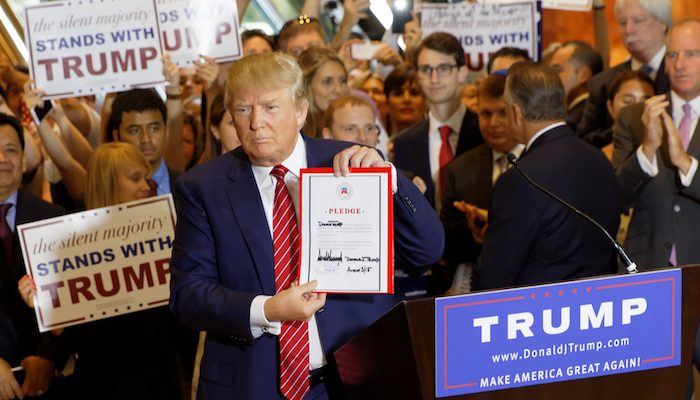
As someone who teaches and publishes about US politics, I’ve resisted from commenting too much on the current US election cycle. But I was shocked when I heard that after fighting a losing battle for so long Ted Cruz suspended his campaign to be the Republican nominee. My surprise was not because I thought Cruz could do it. He is an utterly abhorrent candidate who is hated inside his own party. Republican Party heavyweight John Boehner famously called him ‘Lucifer in the flesh‘ – which may have been the straw that broke the camel’s back, if read as a reality check for Cruz, rather than the defeat in Indiana. My surprise comes at the fact that the Republican Party has finally accepted Trump as their presumptive nominee after playing every card in the anti-Trump deck over the last twelve months.
A lot of commentators have said that Trump’s rise is the climax of a crisis of identify for the Republican Party that has been bubbling away for years. This chatter has become hard to miss online. For those looking for deeper analysis, books have been written on it (examples here and here) tracing the erosion of the party from when the religious right were elevated in the 1980s and onwards, and then the Tea Party were given oxygen post 2008 when Obama was elected and the Democrats continued to hold both Houses of Congress. There is a lot of truth in this compressed analysis, of course it has more nuance than that in reality… but it is without doubt that the Republican Party is in crisis and the crisis is largely one of its own doing. This is not to mention it’s failure to engage with large swathes of the US population due to regressive social and economic policy positions.
Back to what surprises me then, as all the above has been gathering for some time and has been hard to miss. With Trump as nominee I am convinced two things are happening:
First, the Republican party establishment is sanctioning the extremes in the party to have a major moment in the limelight – in front of a general election audience. This is not an admission of defeat vis-a-vis Trump. I do believe the Republican establishment could engineer a technical method to stop Trump if they wanted to (though it would be bloody). Instead, they have decided to give this turn in their party’s path an approved stage.
Second, and this is connected to the first point. The Republican establishment know that Trump will lose. And, that he will lose badly. They are hedging that letting the utter lack of ideology and cohesion that the Trump coalition displays under a general election spotlight will come apart spectacularly giving Hillary Clinton a landslide. With that in mind, the Republican elite can put the Tea Party and the other fringe elements back in the closet, or get them under control, and re-launch the party with the lessons learned. They might take Tony Blair’s ‘New Labour’ episode from the 1990s as an example of how (structurally) this can be done to a major political party. In short, the Republican Party establishment have decided to lose the 2016 election. Even if at the eleventh hour the party springs a surprise and backs another candidate at the convention, the result will be the same. The election will be lost just as badly and the same result applies. With the exception that the rebuilding of the party will begin earlier.
What this means is unclear. It is clear that Trump will not, and cannot, win the White House. But, it is not clear if the Republican Party can put their broken house back together again. It is unlikely the party will split in two, but they surely will emerge slimmer and more focused with certain fringe elements cast off or leaving by refusing to engage with a new agenda.
If I’m wrong and this election concludes with a Trump loss and the Party continuing on the trajectory it has been on for the past three decades then US politics will continue to be jaw dropping to teach and learn – but unfortunately very dangerous. Whatever you think about the US, they are the world’s largest economy, they command world’s largest and most advanced military, and are one of the world’s worst polluters. Each of these are issues that the Republican Party needs to settle major internal debates on (and they are only the tip of the iceberg). In the context of widening inequality and the genuine polarisation in US society laid bare in this election cycle, the US needs both its major political parties to be fit to govern for its own national security and cohesion, and for its stabilising role in global society.
If the Republican Party wheels out another load of oddballs, dunces and clowns to compete for the 2020 ticket, I’m not sure many people will be laughing any more.
Further Reading on E-International Relations
- Opinion – Europe Cannot Ignore the Republican Party’s Shifting Foreign Policy Playbook
- Opinion – Ukraine and the Republican Party’s Drift from the ‘Honor Code’ of Jacksonian Diplomacy
- Opinion – Nationalism and Trump’s Response to Covid-19
- Opinion – Re-election in Doubt: The Perfect Storm Approaches Donald Trump
- When Will America Come Home? When Trump Visits London, Seoul or Berlin
- Trump’s Foreign Policy Doctrine of Uncertainty